New Jersey Future Blog
Common Ground Emerges on Affordable Housing Solutions
July 17th, 2023 by Chris Sturm
“New Jersey has a storied history of working to address affordable housing. For over five decades, municipalities and developers have collaborated and/or clashed in state agencies and in the courts,“ noted Tom D’Allessio, Vice President of Policy, American Planning Association, NJ Chapter, as he opened one of the two lively, productive sessions on affordable housing at the 2023 Planning and Redevelopment Conference. The panelists on these sessions, representing municipal and state officials, housing advocates, planners, and developers at times clashed. Their disagreements, always respectful, included opposing views on the state mandate to build affordable housing in affluent communities, the value of a court-supervised process, the ability of regional planning to facilitate development, and the root causes of local opposition.
Despite diverging perspectives, the speakers found broad consensus on key aspects of affordable housing, including the growing need, remarkable progress, unproductive litigiousness, and the importance of addressing long-standing impediments. A panel titled, Fourth Round Obligations: For Whom? By Whom?, addressed the process by which affordable housing is planned and built pursuant to legal requirements under the Mt. Laurel doctrine. A second panel, Confronting New Jersey’s Housing Affordability Crisis, focused on removing obstacles to developing housing that is affordable to both low- and moderate-income families and also the “missing middle”. New Jersey Future and the New Jersey Chapter of the American Planning Association sponsored the conference.

The panel during the 2023 NJ Planning and Redevelopment Conference virtual session Fourth Round Obligations: For Whom? By Whom? Top row from left to right: Josh Bauers, Senior Staff Attorney, Fair Share Housing Center; Elizabeth McManus, Co-founder, Kyle + McManus Associates, LLC; Jeff Kolakowski, Chief Executive Officer, New Jersey Builders Association. Bottom row from left to right: Paul Muir, Mayor, Bethlehem Township; Ben Spinelli, Executive Director, New Jersey Highlands Council; Thomas Dallessio, Vice President of Policy, American Planning Association – NJ Chapter.
Opportunities for moving forward in the Mt. Laurel Fourth Round. Panelists in the session, Fourth Round Obligations: For Whom? By Whom?, focused on the phase beginning July 1, 2025. Josh Bauers, Senior Staff Attorney, Fair Share Housing Center, listed successes achieved during the past eight years of the Mount Laurel process: more towns (345) have court settlements in place, and 22,000 units of housing affordable to low- and moderate-income households have been built. Paul Muir, mayor of Bethlehem Township and president of the NJ Conference of Mayors, shared his hope for a regional planning approach overseen by a state agency that limits housing obligations based on available support services. Ben Spinelli, executive director of the New Jersey Highlands Council, also argued for a regional approach consistent with the Highlands Regional Master Plan to ensure protection of the drinking water supply. “But where will we grow as a state?” asked Jeff Kokakowski, chief executive officer, New Jersey Builders Association, in the face of limited vacant land and many regulatory requirements. Beth McManus, co-founder, Kyle + McManus Associates, LLC, cautioned that regional planning works well for preservation but makes it “harder to get to growth.”
The speakers found common ground on the need to make the planning and development process more efficient in the Fourth Round. Speakers urged communities to start planning now and quickly reach agreement on housing requirements so, as Ben Spinelli said, “we can spend the time building.”
Panelists recommended that state agencies:
- Coordinate permitting issues across agencies and ensure that road, sewer, water, and transit capacity are available to make development in good locations as easy as possible. (Spinelli and McManus)
- Provide clear direction on where compact development can occur, given multiple, sometimes inconsistent, state regulations. (Kolakowski)
- Determine municipal obligations well in advance of the July 2025 deadline to make it easier and cheaper to get through the settlement process. (McManus)
- Revise regulations to ensure that affordable units are properly integrated into inclusionary projects and are built to similar sizes and standards as market rate units. (McManus)
Panelists recommended that municipal officials:
- Identify areas appropriate for higher density development, which are supported by services, schools, and public facilities. (McManus)
- Lay the groundwork for growth by explaining how it can be positive for the community. (McManus)
- Cooperate with, rather than litigate, the process, and build on experience from the third round. (Bauer)
- Learn how to use the redevelopment statutes and accompanying tools. (Bauer)
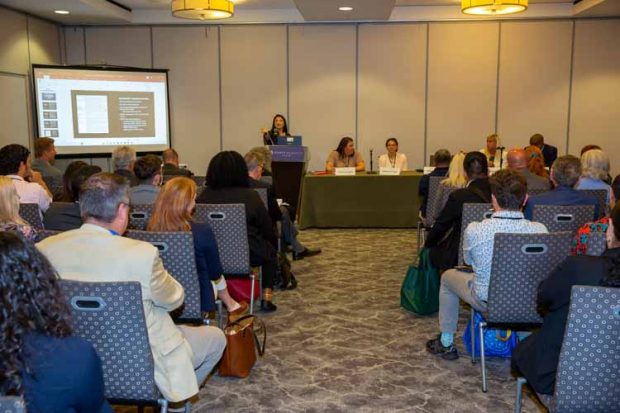
The Confronting New Jersey’s Housing Affordability Crisis session at the 2023 NJ Planning and Redevelopment Conference. Photo by Frank H. Conlon
The framework for providing low, moderate and middle-income housing. Jong Sook Nee, member, Convergent Law, kicked off Confronting New Jersey’s Housing Affordability Crisis with statistics illustrating the extent of the problem. For example, she noted that only 21% of for-sale homes are considered “affordable,” and Northern New Jersey ranks as the nation’s most competitive rental market. Jong outlined many approaches for providing affordable housing including municipal housing authorities, privately owned and operated housing, and the Mount Laurel process, as well as the use of subsidy tools including Low Income Housing Tax Credits, municipal Payments in Lieu of Taxes, and state incentive programs.
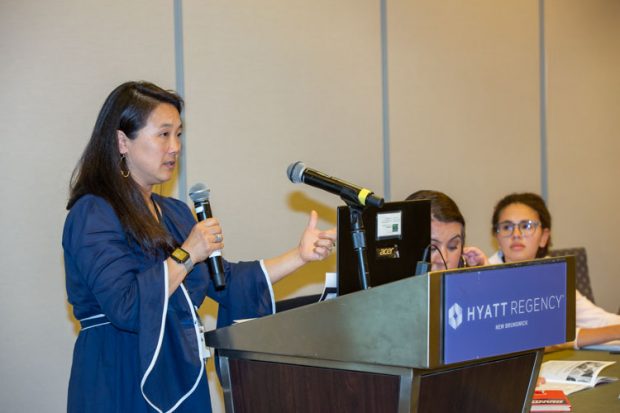
Jong Sook Nee, Member, Convergent Law, speaking during the 2023 NJ Planning and Redevelopment Conference. Photo by Frank H. Conlon
Key challenges: zoning and development process. The four panelists in this session fell into two groups when asked to identify the greatest challenges facing housing affordability. Lorissa Luciani, administrator of affordable housing at the NJ Department of Community Affairs, and Katherine Payne, director of land use, Fair Share Housing Center, cited zoning constraints, including the need for more multi-family zoning and opportunities for dense redevelopment. The panel’s two developers highlighted the importance of the development process. “Process is the hurdle to supply,” noted Deb Tantleff, founding principal of Tantum Real Estate. Patrick Teborg, founder, TD+ Partners, described the benefits of working with “a process-driven municipality” like Plainfield where win-win solutions can be found relatively quickly when the city and the developer employ a “problem-solving” approach. Teborg noted the difficulty of working in affluent municipalities that seek to obstruct affordable housing.
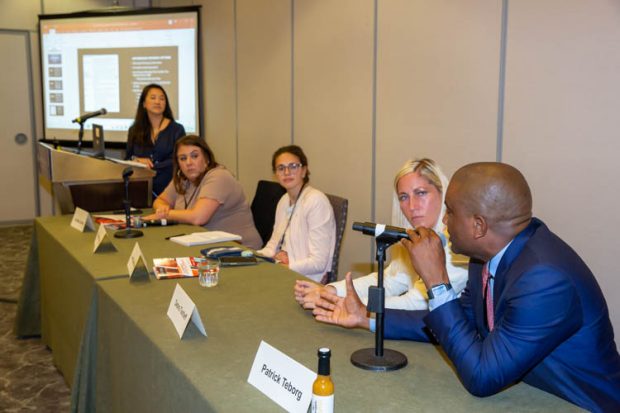
Patrick Terborg, Founder, TD+ Partners, speaking during the 2023 NJ Planning and Redevelopment Conference. Photo by Frank H. Conlon
Actionable recommendations. As with the other housing session, panelists offered actionable recommendations for increasing the supply of housing that is affordable.
Panelists recommended that state agencies:
- Provide a standardized checklist for site plan submission and clarity on buildable locations especially near flood zones. (Deb Tantleff)
- The NJ Housing Mortgage Finance Agency should reform its Low Income Housing Tax Credit program to allow broader participation, including by market-rate developers. (Teborg)
- The Department of Community Affairs (DCA) should dramatically revamp parking requirements in the Residential Site Improvement Standards (Tantleff).
- Ensure, through the Mount Laurel process, that all communities are accessible to people with lower incomes, including those with good schools and other amenities. (Payne)
Panelists recommended that municipal officials:
- Explore newly-funded DCA subsidy programs, which may grant waivers to address record-high per unit construction costs. (Luciani)
- Work with Mount Laurel Fourth Round process, in recognition of the Third Round’s “incredible productivity” at producing multi-family and affordable housing units. (Payne)
- Streamline the process to reduce the time to construction, learn about real estate finance, and loosen zoning restrictions that prevent the kinds of units that consumers want. (Tantleff)
- Provide a transparent, respectful process for developers. (Teborg)
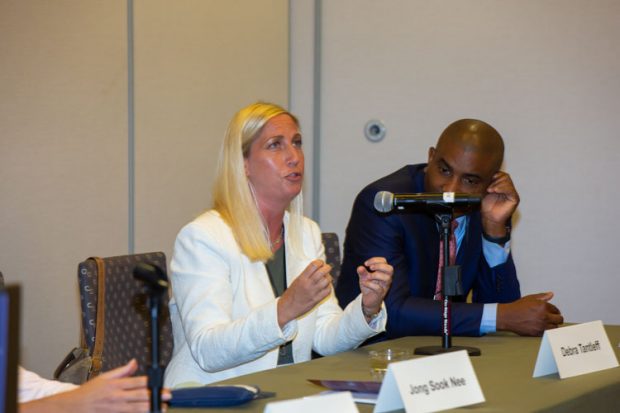
Debra Tantleff, Founding Principal, Tantum Real Estate, speaking during the 2023 NJ Planning and Redevelopment Conference. Photo by Frank H. Conlon
Multi-family housing— the market, the opposition, the constraints. An animated discussion period offered opportunities for panelists and attendees alike to explore the root causes of local opposition to multi-family and affordable housing: racism, fear of density, and “change,” including more traffic and loss of green space. Deb Tantliff recommended local officials focus the conversation on people—in addition to the well-documented demand for compact housing by the under 35 crowd, current residents may want to stay in town and live in more compact units, especially in-town aging baby boomers and recently-divorced parents. The developers noted that “missing middle” or “workforce” housing is hard to build given high fixed costs, especially in affluent communities, and that deed-restricted units for households earning between 80% and 120% of the median may be unable to get financing.
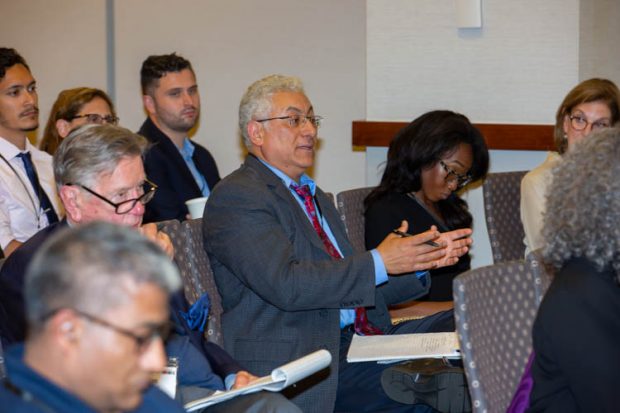
Discussion with the audience during the Confronting New Jersey’s Housing Affordability Crisis session at the 2023 NJ Planning and Redevelopment Conference. Photo by Frank H. Conlon
Housing affordability lies at the heart of New Jersey Future’s commitment to creating strong, healthy, resilient communities for everyone. The Planning and Redevelopment Conference provided an important opportunity for tackling the issue, including two additional sessions on the topic that are not covered here: Resilient and Affordable: Planning for Your Affordable Housing Obligation in the Era of Climate Change and The Changing Faces of New Jersey Developers. Both conference sponsors, New Jersey Future and the New Jersey Chapter of the American Planning Association, plan to hold additional forums to identify ways to ensure well-planned housing that is affordable to people of all means.
Related Posts
Tags: Affordable housing, community, Development, Housing, housing and equity, missing middle, multi-family housing, planning, regional planning, Zoning
















